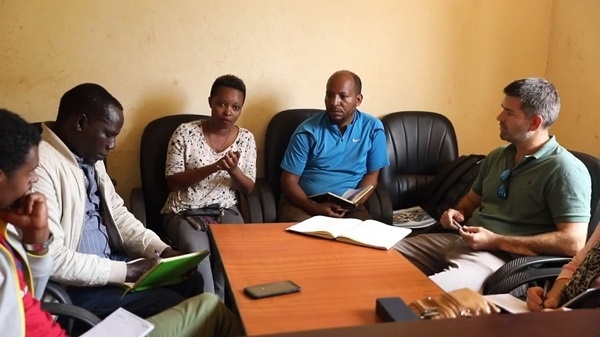
On a cool November afternoon, Nick Allen, NRECA International’s Country Director (Ethiopia), spoke to a room full of people in a community hall in Maji. All were members of the Maji electric cooperative advisory board. Many had walked more than an hour from surrounding kebeles (villages), or villages to be there. They came to hear Allen, NRECA International’s Ethiopia country director, speak to them about what an electric cooperative is, why this model would be a good choice to help bring reliable and affordable electricity to the area, and how NRECA International is working with a well-known non-profit called Maji Development Coalition (MDC) to make it happen.
“We are trying to establish an electric cooperative model here in Maji because we feel it’s one of the more sustainable ways of creating an electric utility that serves the needs of its community,” said Allen during a recent trip to this isolated and rural community.
Maji is located in Southwestern Ethiopia about 400 miles by road from Ethiopia’s capital Addis Ababa and is home to about 700 families. About 22 kebeles with an additional 4800 families surround the area. Electricity is scarce, available only to the very few in town who can afford generators.
A few years ago, Caroline Kurtz, MDC’s executive director, approached NRECA International to help. And the idea to form an electric co-op to bring reliable and affordable electricity to Maji was formed. Originally from Portland, Oregon, Kurtz spent her childhood in Maji and considers it her second home. Last year, she launched an ambitious initiative to provide Maji communities with solar home systems on a lease-to-own basis. Today, more than 250 have been installed, making it possible for families to use light bulbs, charge their mobile phones, and plug in a radio or television. Demand continues to grow, and realizing she didn’t know much about electricity, she brought in some expert help.
“I knew nothing about technology or electricity or solar, but it opened my eyes to what power poverty means for a community,” said Kurtz during the same trip. “When there’s absolutely no power, development really stalls at a very basic level. Healthcare can’t go forward without electricity. Education can only go so far without electricity. Without electricity, the water has to be drawn from a stream or from a trampled spring and it’s dirty and it’s incredibly burdensome. I think the electric co-op model is the answer that Ethiopia is looking for. And I’m very hopeful that this work here that we’ve already started will become a model for the whole country.”
Continue reading this story at NRECA International, Ltd.
About NRECA International, Ltd.
NRECA International, Ltd. is a non-profit subsidiary of the National Rural Electric Cooperative Association (NRECA) dedicated to developing programs that promote economic prosperity in developing countries through technical assistance and training in rural electrification. NRECA represents more than 900 consumer-owned, not-for-profit electric cooperatives, public power districts, and public utility districts in the United States.
